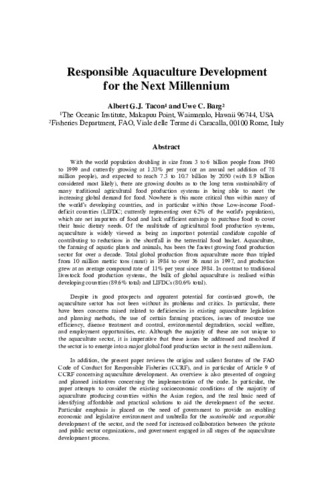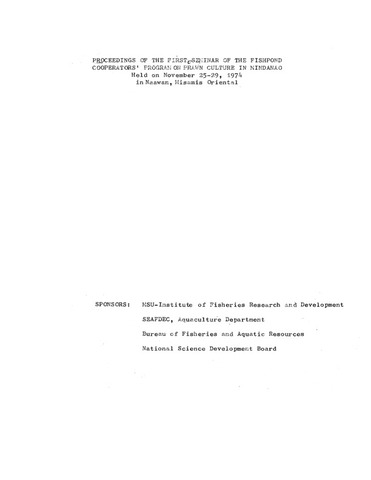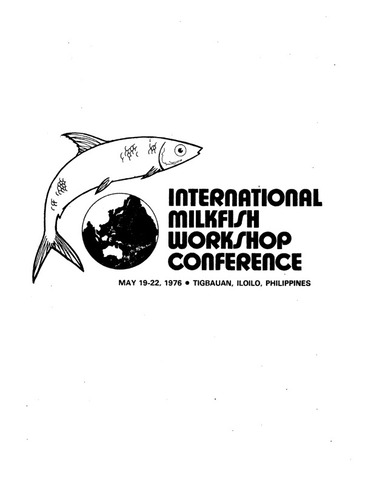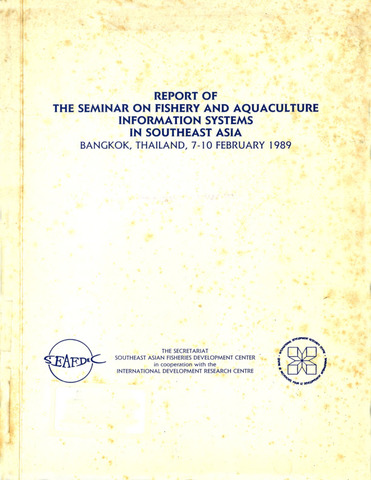Responsible aquaculture development for the next millennium
Share
Abstract
With the world population doubling in size from 3 to 6 billion people from 1960 to 1999 and currently growing at 1.33% per year (or an annual net addition of 78 million people), and expected to reach 7.3 to 10.7 billion by 2050 (with 8.9 billion considered most likely), there are growing doubts as to the long term sustainability of many traditional agricultural food production systems in being able to meet the increasing global demand for food. Nowhere is this more critical than within many of the world s developing countries, and in particular within those Low-income Food-deficit countries (LIFDC ; currently representing over 62% of the world s population), which are net importers of food and lack sufficient earnings to purchase food to cover their basic dietary needs. Of the multitude of agricultural food production systems, aquaculture is widely viewed as being an important potential candidate capable of contributing to reductions in the shortfall in the terrestrial food basket. Aquaculture, the farming of aquatic plants and animals, has been the fastest growing food production sector for over a decade. Total global production from aquaculture more than tripled from 10 million metric tons (mmt) in 1984 to over 36 mmt in 1997, and production grew at an average compound rate of 1 l% per year since 1984. In contrast to traditional livestock food production systems, the bulk of global aquaculture is realised within developing countries (89.6% total) and LIFDCs (80.6% total).
Despite its good prospects and apparent potential for continued growth, the aquaculture sector has not been without its problems and critics. In particular, there have been concerns raised related to deficiencies in existing aquaculture legislation and planning methods, the use of certain farming practices, issues of resource use efficiency, disease treatment and control, environmental degradation, social welfare, and employment opportunities, etc. Although the majority of these are not unique to the aquaculture sector, it is imperative that these issues be addressed and resolved if the sector is to emerge into a major global food production sector in the next millennium.
In addition, the present paper reviews the origins and salient features of the FAO Code of Conduct for Responsible Fisheries (CCRF), and in particular of Article 9 of CCRF concerning aquaculture development. An overview is also presented of ongoing and planned initiatives concerning the implementation of the code. In particular, the paper attempts to consider the existing socioeconomic conditions of the majority of aquaculture producing countries within the Asian region, and the real basic need of identifying affordable and practical solutions to aid the development of the sector. Particular emphasis is placed on the need of government to provide an enabling economic and legislative environment and umbrella for the sustainable and responsible development of the sector, and the need for increased collaboration between the private and public sector organizations, and government engaged in all stages of the aquaculture development process.
Suggested Citation
Tacon, A., & Barg, U. C. (2001). Responsible aquaculture development for the next millennium. In L. M. B. Garcia (Ed.), Responsible Aquaculture Development in Southeast Asia. Proceedings of the Seminar-Workshop on Aquaculture Development in Southeast Asia organized by the Aquaculture Department, Southeast Asian Fisheries Development Center, 12-14 October 1999, Iloilo City, Philippines (pp. 1-26). Tigbauan, Iloilo, Philippines: Aquaculture Department, Southeast Asian Fisheries Development Center.
Subject
Collections
- ADSEA '99 [21]
Related items
Showing items related by title, author, creator and subject.
-
Proceedings of the First Seminar of the Fishpond Cooperators' Program on Prawn Culture in Mindanao held on November 25-29, 1974 in Naawan, Misamis Oriental
MSU-Institute of Fisheries Research and Development; Southeast Asian Fisheries Development Center, Aquaculture Department; Bureau of Fisheries and Aquatic Resources; National Science Development Board (1974) -
International Milkfish Workshop Conference, May 19-22, 1976, Tigbauan, Iloilo, Philippines
Southeast Asian Fisheries Development Center, Aquaculture Department; International Development Research Centre (Aquaculture Department, Southeast Asian Fisheries Development Center, 1976) -
Report of the Seminar on Fishery and Aquaculture Information Systems in Southeast Asia, Bangkok, Thailand, 7-10 February 1989
Southeast Asian Fisheries Development Center; International Development Research Centre (Secretariat, Southeast Asian Fisheries Development Center, 1989)The need to improve fisheries information management in the region was recognized as early as 1982 when SEAFDEC, in collaboration with IDRC, organized the Seminar on Fisheries Information Science in Southeast Asia. During ...





